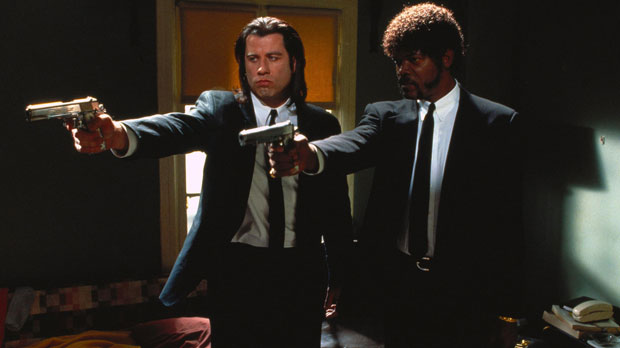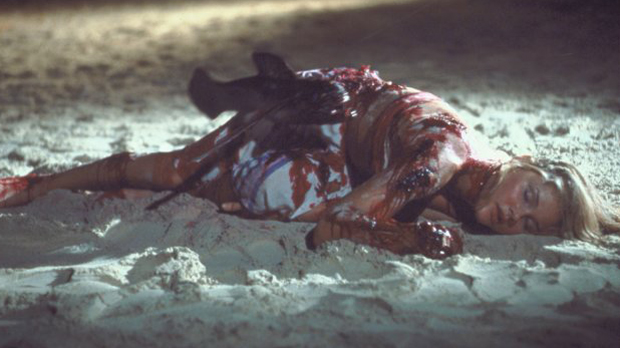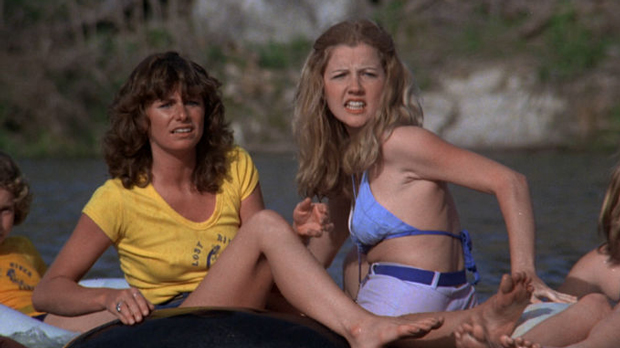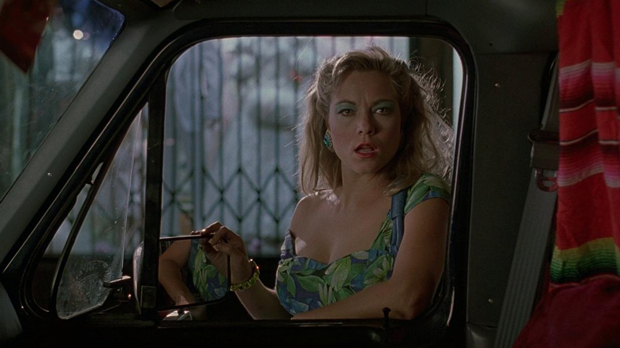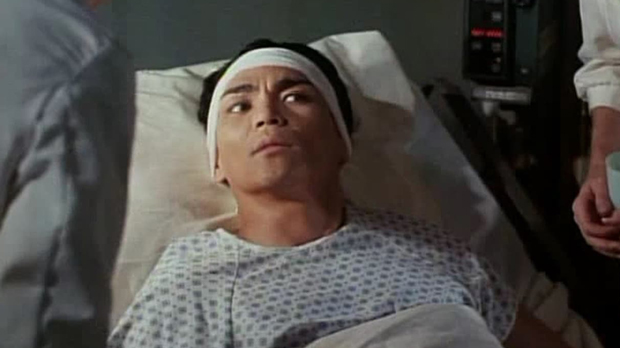 Pulp Fiction (1994) Miramax/Action-Drama-Comedy RT: 154 minutes Rated R (non-stop profanity and racial epithets, strong graphic violence including rape, sexual content, graphic drug abuse, thematic elements) Director: Quentin Tarantino Screenplay: Quentin Tarantino Music: N/A (various artists) Cinematography: Andrzej Sekula Editing: Sally Menke Release date: October 14, 1994 (US) Cast: John Travolta, Samuel L. Jackson, Uma Thurman, Bruce Willis, Harvey Keitel, Tim Roth, Amanda Plummer, Maria de Medeiros, Ving Rhames, Eric Stoltz, Rosanna Arquette, Christopher Walken, Quentin Tarantino, Frank Whaley, Phil LaMarr, Peter Greene, Duane Whitaker, Paul Calderon, Steve Buscemi, Bronagh Gallagher, Julia Sweeney, Alexis Arquette, Kathy Griffin. Box office: $107.9M (US)
Pulp Fiction (1994) Miramax/Action-Drama-Comedy RT: 154 minutes Rated R (non-stop profanity and racial epithets, strong graphic violence including rape, sexual content, graphic drug abuse, thematic elements) Director: Quentin Tarantino Screenplay: Quentin Tarantino Music: N/A (various artists) Cinematography: Andrzej Sekula Editing: Sally Menke Release date: October 14, 1994 (US) Cast: John Travolta, Samuel L. Jackson, Uma Thurman, Bruce Willis, Harvey Keitel, Tim Roth, Amanda Plummer, Maria de Medeiros, Ving Rhames, Eric Stoltz, Rosanna Arquette, Christopher Walken, Quentin Tarantino, Frank Whaley, Phil LaMarr, Peter Greene, Duane Whitaker, Paul Calderon, Steve Buscemi, Bronagh Gallagher, Julia Sweeney, Alexis Arquette, Kathy Griffin. Box office: $107.9M (US)
Rating: ****
For openers, Pulp Fiction is the movie that SHOULD have won the 1994 Best Picture Oscar, not Forrest Gump. I still can’t believe it beat out Quentin Tarantino’s sophomore effort. It’s the more original of the two movies! By way of non-linear narrative, QT turned the hackneyed gangster genre inside out and delivered one the most original films of the decade. He also achieved the impossible by resurrecting the career of John Travolta, an actor thought to have reached his peak with Saturday Night Fever (1977) and Grease (1978). Surprisingly, Travolta delivered a performance that got him a well-deserved Oscar nomination for Best Actor (Tom Hanks took it home that year, grrrr!)
Pulp Fiction received seven Academy Award nominations- Best Picture, Best Director (Tarantino), Best Actor (Travolta), Best Supporting Actor (Jackson), Best Supporting Actress (Thurman), Best Original Screenplay and Best Editing. It took home only one Oscar, Best Original Screenplay (Tarantino and Roger Avary) thus proving once again that the voting members of the Academy have no balls. They consistently award the highest honors to safe movies like Ordinary People, Dances with Wolves and Forrest Gump while overlooking bolder films like Raging Bull, Goodfellas and Pulp Fiction. What’s especially grievous is Gump is nothing more than a rip-off of Being There and Zelig. How original is that? It’s not.
On the other hand, Pulp Fiction‘s fractured narrative with its intersecting storylines and characters makes for awesome entertainment. In a word, this movie is BRILLIANT! It proves beyond a shadow of a doubt that QT is one of the most gifted young filmmakers of the late 20th century. He’s in the same league as Martin Scorsese and Francis Ford Coppola.
You’ll notice I included the name of the film’s editor in the header. That’s because she plays a crucial role in this film’s brilliance, I’ve never seen an editing job this masterful. All I can say is “WOW!”. It still impresses me 30 years later. It’s hard to believe it’s been that long since Pulp Fiction hit theaters and became one of the coolest independent films of the 90s.
Pulp Fiction tells three different stories, but in a non-linear fashion. The events aren’t told in order so it becomes a cinematic jigsaw puzzle that the viewer must put together for him/herself. The movie opens with a young couple, Pumpkin (Roth, Reservoir Dogs) and Honey Bunny (Plummer, The Fisher King) sitting in a coffee shop debating the merits of robbing the joint. Finally, they jump up and announce a hold-up. That’s when the opening credits kick in with Dick Dale’s awesome surf-rock song “Misirlou” playing on the soundtrack.
The scene then switches to Jules Winnfield (Jackson, Jackie Brown) driving along with Vincent Vega (Travolta) discussing the latter’s recent trip to Europe. They’re a couple of gangsters on their way to a seedy hotel room to pick up a briefcase for their boss Marcellus Wallace (Rhames, the Mission Impossible movies). It doesn’t matter what’s in the briefcase. It’s merely a “MacGuffin”, an object that serves to keep the plot in motion despite the lack of intrinsic importance. The guys burst into the hotel room where Jules makes conversation with Brett (Whaley, The Doors), one of the young men sitting around eating a cheeseburger breakfast. After a few moments, Jules becomes angry and recites a Bible verse before executing Brett.
These opening moments serve as an introduction to some fascinating characters in L.A.’s seedy underbelly- a collection of hitmen, drug dealers, gangsters and other assorted lowlifes. The first story (“Vincent Vega and Marcellus Wallace’s Wife”) in Pulp Fiction concerns Vincent taking Marcellus’ attractive young wife Mia (Thurman, the Kill Bill movies) for a night out on the town while he’s away on business. Rumor has it that Marcellus severely injured an associate because he gave his wife a foot massage. After a quick stop at his friend Lance’s (Stoltz, Mask) for some high-grade heroin, Vincent arrives at the Wallace home to take Mia to an expensive 50s themed restaurant (Jack Rabbit Slim’s). The evening gets pretty surreal from here on in as Vincent debates whether to cave in to Mia’s obvious flirting and ignite his boss’ jealous wrath.
The second story (“The Gold Watch”) has Butch Coolidge (Willis, the Die Hard movies), an aging prizefighter trying to get out of L.A. after reneging on his promise to Marcellus to throw his latest match. Unfortunately, he discovers he has to return to his apartment because his girlfriend Fabienne (Medeiros, Henry & June) left behind his father’s watch.
The third and final story (“The Bonnie Situation”) tells what happens after Jules and Vincent collect the briefcase and leave the hotel room. Vincent accidentally shoots Marvin (LaMarr, Free Enterprise) in the back of Jules’ car and makes a bloody mess. They have to find a way to deal with this grave situation so they go to the home of Jules’ friend Jimmie (QT himself) until they have it figured out. They call in Winston Wolf (Keitel, Reservoir Dogs), a “cleaner” who specializes in cleaning up messy situations such as this.
Don’t get frustrated if you have a hard time following Pulp Fiction. It presents a challenge for casual movie viewers who aren’t used to such innovative cinema techniques. I’ve heard this complaint from several people who thought that this movie would be just another routine crime drama. That’s exactly what Tarantino’s masterpiece is not, routine. Among other things, it’s a homage to several genres- gangster movies, film noir, blaxploitation flicks, violent thrillers, etc.
Film buffs will love Pulp Fiction because they can sit and pick out the myriad of obscure movie references. Look at the scene where Butch chooses a weapon to deal with a very pressing and urgent matter in a pawn shop. One could attach a specific film title with each weapon he considers- i.e. hammer (The Toolbox Murders); baseball bat (Walking Tall), chainsaw (The Texas Chainsaw Massacre) and samurai sword (Shogun Assassin). QT worked at Video Archives in Manhattan Beach (Los Angeles, CA.) before he started making movies. His job gave him access to thousands of obscure B titles. His movies always feature shout-outs to unknown and/or forgotten films that he wants to bring to the audience’s attention. Of course, he includes other film references that most viewers will get. One would have to be blind, deaf and dumb to miss the reference to the 1972 John Boorman classic Deliverance (you’ll know it when it happens!). In the same sequence, there’s a reference to one of Boorman’s more obscure movies, the 1974 sci-fi cult classic Zardoz. It would be fair and accurate to say that Pulp Fiction is a film lover’s wet dream come to life.
All of the performances in Pulp Fiction are first-rate. There’s not one lackluster performance throughout the entire two-and-a-half hours. We’re talking about almost two dozen different actors playing significant roles here. That’s quite an amazing accomplishment. I’ve already mentioned Travolta’s incredible performance, the one that brought him back to the collective consciousness of the American movie going public. QT tailored the role to emphasize the actor’s strengths. We also get to see him dance again in a scene that recalls both Saturday Night Fever (big dance contest) and Grease (to a 50s song, Chuck Berry’s “You Never Can Tell”).
Jackson, sporting a Jheri-curled Afro, delivers his lines in his own trademark style. Nobody does it quite as good as Mr. Snakes on a Plane himself. He sees surviving an attempt on his life as a sign from God to get out of the gangster business. He already recites a particular Bible verse (Ezekial 25:17) before he shoots somebody, but now he believes God is telling him to lay down his arms and walk the Earth like David Carradine’s character from Kung Fu.
Thurman, in one of her best performances, looks stunning as a brunette as she attempts to seduce Vincent with a stoned, blank-eyed stare and coquettish smile. QT expresses his affection for ladies’ feet by following Uma’s bare soles walking through her home to greet Vincent. Willis makes a great palooka. He’s totally convincing as the aged boxer who’s a bit punchy after years of abuse in the ring. Keitel stands out as Wolf, the efficient cleaner with no time for pleasantries.
Christopher Walken (The Dogs of War) shows up as the soldier who presents young Butch with his father’s watch. He relates the strange and fascinating history of the watch including how they hid the watch during their seven years in a Vietnamese POW camp. Rosanna Arquette (Desperately Seeking Susan) plays Lance’s body-piercing obsessed girlfriend. The actress still looks good with a face full of metal. She explains the benefits of having her tongue pierced and, I have to admit, it actually makes sense. I could go on and on about the performances in Pulp Fiction, but that would take up way too much space so take my word for it, they’re all amazing.
As always, QT selects a top-notch soundtrack starting with “Misirlou” over the opening credits. Then somebody changes the station to Kool & the Gang’s “Jungle Boogie” for Jules and Vincent’s drive to collect the purloined briefcase. Over 154 glorious minutes, we’re treated to a bevy of awesome tunes like “Let’s Stay Together” by Al Green, “Son of a Preacher Man” by Dusty Springfield, “Flowers on the Wall” by The Statler Brothers and a whole bunch of vintage 60s surf-rock songs. It’s an eclectic mix to say the least. One of the highlights is a cover of Neil Diamond’s “Girl, You’ll Be a Woman Soon” by Urge Overkill. Pulp Fiction should have won a special Oscar for its musical diversity. One of the cool things about QT is that he doesn’t rely on a traditional score for his movies. He borrows snatches of scores from other movies in addition to the songs. He’s especially fond of the work of Italian composer Ennio Morricone (but who isn’t?).
I’ve already praised the brilliant editing by Sally Menke. It set a new standard of excellence in filmmaking; other directors have since used the idea of non-linear narrative. One of the best examples is 1995’s The Usual Suspects, a movie that I intend to review very soon.
I’ll conclude this unusually lengthy review by saying that Pulp Fiction can absolutely be classified as a modern film classic. It’s criminal that it didn’t receive more recognition on Oscar night. Any of the characters from this movie could kick Forrest’s ass any day of the week. Its enduring popularity acts as a testament to their grievous error made by the Academy that night in ’95. People still love Pulp Fiction with new generations of movie geeks learning to appreciate this masterpiece. Can the same be said about Forrest Gump? NOPE!
